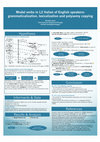Conference Presentations by Borbala Samu
Romance Turn 3, Workshop on the Acquisition of Romance Languages, Southampton, 2008
AATI Conference in Cagliari, 20-24 giugno 2018, 2018
Obiettivo: indagare sul ruolo della prospettiva contrastiva nell'insegnamento delle lingue stra... more Obiettivo: indagare sul ruolo della prospettiva contrastiva nell'insegnamento delle lingue straniere e di offrire degli strumenti concreti ai docenti che insegnano italiano ad apprendenti anglofoni che possano renderli più consapevoli dei problemi che derivano dall'influenza della loro L1.

Verona, XIV Congresso Internazionale di Studi dell’Associazione Italiana di Linguistica Applicata (AItLA), «Grammatica applicata: apprendimento, insegnamento, patologie», 2014
L’obiettivo è quello di illustrare i primi risultati di una ricerca che ha come oggetto lo studio... more L’obiettivo è quello di illustrare i primi risultati di una ricerca che ha come oggetto lo studio dell’acquisizione dei mezzi linguistici atti ad esprimere la categoria della modalità deontica in italiano L2. Si presentano 1) i mezzi linguistici utilizzati dagli apprendenti per esprimere la funzione linguistica ‘dare istruzioni’, 2) il corpus utilizzato, 3) le ipotesi sulla sequenza acquisizionale delle forme dell’imperativo in italiano L2 formulate in base a lavori fondamentali che sono stati fatti in precedenza sull’argomento, 4) un riassunto del’analisi dei dati, 5) la discussione. Queste ultime due sezioni ruotano intorno a due assi fondamentali, strettamente collegati tra di loro: la sequenza dell’acquisizione delle forme dell’imperativo e le strategie indirette a cui ricorrono gli apprendenti per evitare di usare l’imperativo diretto nello svolgimento dei compiti comunicativi richiesti.

More than one language in the brain: acquisition and coexistence. Workshop at the University for Foreigners of Perugia, 2015
This study is part of a larger research project aimed at describing the acquisition of modality i... more This study is part of a larger research project aimed at describing the acquisition of modality in Italian as a second language. The study is basically cross-sectional. The informants were 16 American university students, who lived and learned in Italy at the time of the research. There is also a small control group constituted by 2 Italian native speakers. The 16 learners are divided according their proficiency in Italian in 4 different level-groups, going from A1+ to C1. I purposefully selected participants who did not speak any other foreign language apart from Italian. Two structured interviews were proposed to the informants, at the distance of four months. The interviews included guided conversations, role-plays and specific tasks designed to stimulate the production of modalized utterances; for example formulating hypotheses for epistemic modality or giving instructions for deontic modality. In the data, on the one hand, I found a series of examples where learners used lexical elements such as the Italian verb of possession avere or avere bisogno, an expression which means physical or material need or the verb volere, which means want, endowing these forms with a modal meaning of deontic necessity and creating in this way modal expressions non-existent in the target language. This kind of examples were registered until level B1 and they were not found at higher levels in the data. On the other hand, until level B1 the Italian modal verbs dovere and potere (that is must and can) occurred in their deontic (or, more precisely root) meaning. At higher proficiency levels and in some specific contexts they could acquire an epistemic modal meaning and only at a very high proficiency level they would appear context independently in their epistemic meaning. Why are these cases so particular? Because they apparently replicate cross-linguistically relevant tendencies of some lexical meanings to develop into grammaticalized modal means (as described for example by Bybee, Perkins and Pagliuca or by van der Auwera e Plungian) and the tendency of deontic modal verbs to originate epistemic meanings (as demonstrated for ex. by Traugott 1989 or by Heine, Claudi e Hünnemeyer). Now, the question is: can the interlanguage replicate processes of diachronic grammaticalization? And if it does, how can we characterize the grammaticalization of modal means in L2? Or, conversely, are we facing cases of polysemy copying, that is a transfer from L1?
AATI Parlermo International Conference 2017, 2017
This study, based on a specific learner corpus, explores how English speakers acquire the express... more This study, based on a specific learner corpus, explores how English speakers acquire the expressions of requesting and commanding in Italian. Imperative mood is the commonest way of expressing commands in languages of the world and it tends to be short or may have no marking at all. We would expect that in L2 Italian Imperative is learnt early and easily. Instead, we find that it appears late and with many difficulties. The reason lies in the formal and pragmatic markedness of this verbal mood and in its effective usage in Standard Italian. The results indicate a new way to teach Imperatives and Commands in the Italian language class.

Uploads
Conference Presentations by Borbala Samu